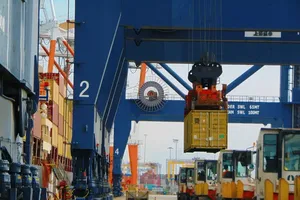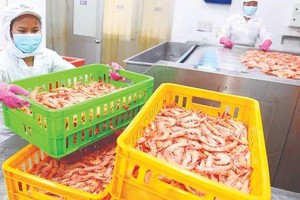Inconvenient location
 |
On the afternoon of 28 June in Vung Tau City, the Board of Directors of the Construction Development Investment Corporation (DIC Corp) decided to cancel the 2023 Annual General Meeting (AGM) of shareholders because the number of attending shareholders accounted for only 36.91 percent of the total voting shares. Mr. Tran Quy Thanh, a shareholder holding a large stake in DIC Corp of 5 percent shares was not present at the AGM.
Mr. Tran Thien Tuan, Chairman of the Board of Directors of the DIC Corp, admitted that the reason why the meeting could not be held was that the shareholder structure included too many retail investors. According to the list finalized by the Securities Depository Center on 24 May, the DIC Corp has 64,907 shareholders of which most are retail shareholders who trade by surfing. There was a time when the company had up to 80,000 shareholders.
Therefore, the absence of major shareholder Mr. Tran Quy Thanh was also the reason why the AGM could not proceed. This is not the first time that the DIC Crop was unable to hold the AGM due to insufficient voting shareholders. Previously, in September 2022, the DIC Corp also could not hold an extraordinary General Meeting of shareholders to discuss plans to increase capital.
At the unsuccessful AGM on 28 June, the group of shareholders related to Mr. Tuan held 23.6 percent of the shares, while the rest of the smaller shareholders held 13.3 percent of the shares. In order to achieve a ratio of over 50 percent to hold the AGM, an additional 14.1 percent of shares are required. This is extremely difficult because the Board of Directors of the DIC Corp was obstinate about organizing the meeting in Vung Tau instead of in Ho Chi Minh City, where it would have been more convenient for investors.
Need for capital
The DIC Corp actually specializes in the field of real estate. But according to Mr. Nguyen Quang Tin, General Director of DIC Corp, the real estate sector faces three main risk factors. The first factor includes market risks, product risks, and declining purchasing power. The second factor includes the financial risk from the seller and the buyer not being able to raise sufficient capital to fully implement the project. If this situation lasts, the real estate businesses will fall into dire situations when buyers are under pressure to pay high-interest rates. The third factor is that real estate businesses are subject to prolonged legal risks.
Compared to other real estate businesses, the DIC Corp is at a disadvantage because of its slow sales. The reason is that most of the DIC Corp projects are inclined towards speculation. The main projects that the company is implementing are mainly land products, so most of the customers are speculators. This is a cautious segment, so it negatively affects the products of the company. To be able to get out of the current difficult situation with a land fund of more than 5,000 hectares, the DIC Corp needs a huge capital source.
According to a representative of DIC Corp, this year's development investment capital plan is VND 4,138 bln, with nearly VND 2,760 bln for ongoing projects, VND 96 billion for research and project investment, nearly VND 1,253 billion for land use fees, and VND 30 bln for financial investment.
In addition, and on the basis of the business and investment plan of 2023, in order to actively arrange capital for a number of projects, the Board of Directors of DIC Corp also plans to submit to shareholders for approval the loan policy. Specifically, a number of project plans to borrow money this year such as the Cap Sant Jacques complex with nearly VND 424 bln, the DIC Star Vi Thanh Hotel with VND 290 bln, the DIC Emera apartment building with VND 1,044 bln, and social housing in Nam Vinh Yen New Urban Area with VND 430 bln.
Sensitive time
In addition to the bank loan plan, DIC Corp will have to plan to also increase capital in the near future. In the context that cash balance is not much, credit capital and bonds are difficult, hence the issuance of shares is very necessary. However, the ability to raise capital of DIC Corp at this time is very difficult, because, before that, the company had to cancel the plan to issue 100 million shares with a selling price of VND 15,000 to increase capital. Earlier, DIC Corp had planned to issue this number of shares at the price of VND 30,000, then reduce it to VND 20,000 due to unfavorable fluctuation in the share price.
Assuming that if the capital increase is successful, Mr. Tuan's family is likely to lose the right to run the business if the group of potential large shareholders increases their holding rate. Currently, until a group of large shareholders spend about VND 1,000 bln to collect 30 percent of the shares and nominate three members to the Board of Directors, Mr. Tuan's Board of Directors will face difficulties. It is not too difficult to collect DIG shares on the exchange with the current large number of floating shares. For instance, on 22 June, there were 47.7 million DIG shares matched with a total trading value of VND 1,085 bln.
According to a financial expert, the loss of the right to run DIC Corp to another large group, if it happens, is the inevitable consequence of vague management and signs of group interests of the members of Mr. Tuan's family. This expert also raised questions that the large group of shareholders in DIG wanted to capitalize their capital contribution in many ways such as by dividing into many owners to avoid information disclosure; stock mortgaged to borrow capital, and when the value of the stock decreases, they are forced to sell to pay debt or supplement assets.
In fact, Mr. Tuan's group sold the shares they owned after using this right to put people on the Board of Directors. This amount is invested by the group of shareholders for other purposes. The General Meeting of shareholders could not be conducted due to insufficient shares and due to not being able to raise money to buy back.
























